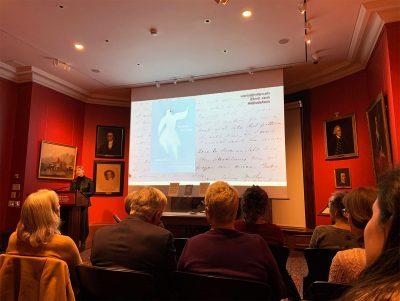What did maternity feel like in the past? How did mothers and wet nurses convene to raise children? And in what ways did tradition factor into the lives of these women?

To conceptualize the experience of maternal figures of past and present, British feminist historian and associate professor of history at Indiana University Bloomington Sarah Knott shared her 2019 memoir, titled “Mother is a Verb,” at the Massachusetts Historical Society on Wednesday evening. The work includes excerpts of letters and factual accounts of female experiences from the 17th century onward to establish a concrete history of the once voiceless women.
The presentation, held in the MHS Treasury Gallery, was focused on the impeding nature of infants and the concept of time when raising children. Knott shared an anecdote found in a telegram, in which a young daughter finished writing her mother’s letter as her mother became burdened with a younger child.
“The lessons of the memoir is very much to tell us about intimate life often holts when they get to infants,” Knott said in the presentation. “So these lessons did tell me about one frequent feature of being with an infant in the colonies: the experience of being seemingly interrupted.”
Knott said the interruption of a mother’s life when having children is frequently seen in the personal papers and diaries found within MHS databases, parts of which Knott said she utilized in researching her book.
Throughout the discussion, Knott said these simple histories of female experiences, which often do not contain comments on infant life, help assume a viewpoint and perspective of mothers from the 1600s into the 21st century.
Peter Drummey, a librarian at MHS, wrote in an email that focusing on women’s histories illuminates the lives of voiceless figures, especially in the Massachusetts area.
“The high rate of literacy in early New England meant that women living here — and women from here who moved onward through the world in the 18th and 19th centuries — are well represented in the ‘anecdotes’ that make up [Knott’s] work,” Drummey wrote. “History seen through the lens of feminism is, or should be, of interest to everyone.”
Knott spoke to around 30 attendees about the cultural and antiquated traditions of motherhood she discovered in her research. In highlighting her point, she shared 20th century child health reformer Truby King’s notion that babies should not be touched or physically nurtured, but rather treated as self-sufficient members of society.
“The Truby King movement basically suggests that you couldn’t hug a baby too little,” Knott said. “Babies were better cared for by putting them down in a bed in fresh air and left alone.”
Gavin Kleespies, director of programs, exhibitions and community partnerships at MHS, said despite the difficulties with telling stories of previously silent and powerless citizens, female voices from centuries ago still hold power and impact on current day conceptions.
“It’s always important to highlight women’s history and also pieces of history that are often overlooked,” Kleespies said. “Motherhood and childbearing is often something that isn’t discussed and it’s sort of glossed over in the more mainstream historical presentations.”
“Mother is a Verb” is both a historical recount of the lives of previous mothers and a memoir from Knott’s own experience as a mother to her son. By interweaving historical accuracies of the past with the personal reality of her present, Knott said the past contains current and enduring truths that she uncovered throughout her research, and that these truths serve as an opportunity for reflection.
“In writing this work, what I found was [evidence of] both recognition and often reality in the experiences of people in the past,” Knott said.
MHS, which focuses primarily on the 16th and 17th century histories specific to the Boston community, hosted Knott in an effort to reach a younger generation of curious minds, Sarah Bertulli, a public programs coordinator at MHS, said. Knott’s presence symbolizes an attempt to discover new mediums by engaging with different historical content, according to Bertulli.
“For something like Sarah Knott’s book, our collection and our institutional knowledge [are] very deeply rooted in the Revolutionary era,” Bertulli said. “But we also love the opportunity to branch out and to do really interesting and unique history.”
Attendee Catherine Treesh, a PhD candidate in early American history at Yale University, said this alternate direction in society’s stereotypical agenda is important. Treesh currently works as a researcher at MHS and said she believes examining history is foundational to addressing the successes and failures of today’s world, including in the context of modern-day feminism.
“I think it relates to the bigger question about why history is important,” Treesh said after the event. “The rules aren’t always the rules and haven’t always been the rules … [History] helps us second guess what we think of as the norm.”























































































































